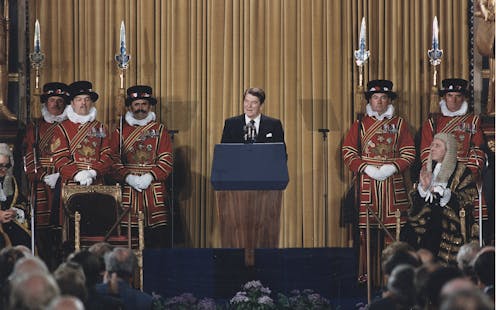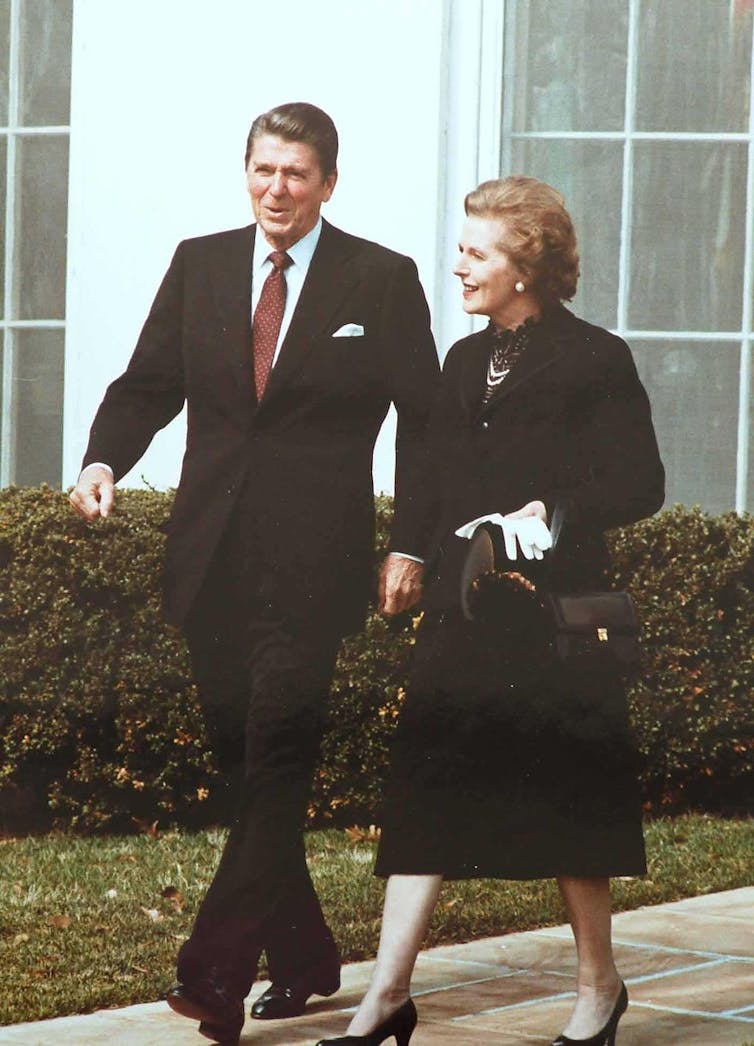
Ronald Reagan became the first US president to address both houses of parliament on June 8 1982. His Westminster speech created a stir at the time. It marked the start of the evolution of the Reagan doctrine, his approach to foreign affairs that sought to support freedom and roll back Communist aggression.
The UK prime minister, Margaret Thatcher, was determined to grant Reagan the rare honour of addressing British parliamentarians at Westminster. Her political opponents were not so keen. For Labour leader Michael Foot, Reagan’s conservative policies made him too divisive a figure to speak. But the speech went ahead and Reagan later wrote in his memoirs that it was one of his most important.
Words matter. Those of the US president in particular have enormous influence on political and popular discourse. Forty years on, several lines from the Westminster speech still carry weight.
Reagan on geopolitics
The US policy of containment toward the Soviet Union during the cold war had resulted in the consolidation of a divided world. It had led politicians, policymakers and scholars to accept that the globe would remain split between the capitalist west and the communist east, with each bloc competing for influence over the so-called third world.
Since the Nixon administration, the American pursuit of a détente – an easing of tensions with the Soviet Union – had underlined the notion that the cold war could only be managed, not won. Reagan’s Westminster speech, by contrast, was a bold declaration that the cold war actually could be won. He imagined a world beyond the threat of nuclear war:
The march of freedom and democracy […] will leave Marxism-Leninism on the ash-heap of history as it has left other tyrannies which stifle the freedom and muzzle the self-expression of the people.
His comments drew admiration from his supporters, but bemusement from others. While the popular perception is that Reagan enjoyed Thatcher’s iron-clad support in aggression toward the Soviet Union, the reality was more complicated.
It is true that Thatcher admired the Westminster speech, but she was less impressed with Reagan’s dream of a world without nuclear weapons. Reagan almost made this a reality when he met Soviet leader Mikhail Gorbachev at Reykjavik in 1986. Upon hearing about this meeting, Thatcher furiously told her aides that technology could not be un-invented and she would not abandon the UK’s nuclear deterrent.
Reagan’s rhetoric at Westminster challenged conventional wisdom about both the nature of international relations and the role of government in American life. His 1981 inaugural address had similarly broken with the status quo, declaring that “government is not the solution to our problem, government is the problem”.

Anglo-American relations
Reagan’s speech made references to celebrated transatlantic figures and the history of Anglo-American relations. As has been emphasised since the second world war and is still commonplace today, this sought to underline the specialness of the Anglo-American relationship.
Of course, given the United States’ beginnings as a rebellion against the colonial rule of the British king, Anglo-American relations have not always been celebrated as “special”. At Westminster, Reagan joked that “it was best to let bygones be bygones”, referring to comments Thatcher made in 1981 during a visit to Washington DC about the American revolution and “a little rebellion now and then” being “a good thing”.
Reagan also praised Winston Churchill’s leadership, echoing some of his particularly famous observations about totalitarian regimes reaching from “Stettin on the Baltic to Varna on the Black Sea”. And he publicly declared his support for the Falklands war, which had broken out two months prior. As British and Argentinian forces disputed the sovereignty of those South Atlantic islands, Reagan sought to put to rest widespread doubts about US support for the British position.
Reagan’s administration had been divided on the issue. Some believed a peace agreement was urgently needed to avoid the military junta that ruled Argentina being humiliated by the conflict, as it risked the rise of a leftist government there. Reagan, by contrast, emphasised to the British politicians the shared Anglo-American commitment to democracy and the rule of law.
Voices have been raised protesting their sacrifice for lumps of rock and earth so far away. But those young men aren’t fighting for mere real estate. They fight for a cause – for the belief that armed aggression must not be allowed to succeed.
The speech demonstrates the significance attached to the words of a US president. Thatcher would not be the last prime minister to be grateful for presidential support for a controversial policy.
It is also an example of the overlap between domestic politics and foreign affairs. It further established the “special relationship” between Reagan and Thatcher. The president had endorsed Thatcher’s decision to go to war for the Falklands. The prime minster had ensured Reagan delivered a major speech to an international, and, crucially, a domestic audience back in the US.
At Westminster Reagan called for allies to join “a crusade for freedom that will engage the faith and fortitude of the next generation”, where “all people are at last free to determine their own destiny”. He argued that “military strength is a prerequisite to peace” albeit “in the hope it will never be used”. This has striking parallels with the resurgence of Nato’s unity in light of the Russian invasion of Ukraine.
For Reaganites – who describe the 40th president as the “great communicator” – his ideas and delivery were timeless. For his critics, this speech was another example of the reckless and dangerous rhetoric with which he escalated tensions, even risking a “hot war” with the Soviet Union. Less than a year later, he would go on to describe the USSR as an “evil empire”. Forty years on, his words at Westminster drive home a truth about history: plus ça change.
James Cooper's research has been supported by grants and fellowships from the US-UK Fulbright Commission, the Norwegian Nobel Institute, the George H.W. Bush Presidential Library and the Gerald R. Ford Presidential Library.
This article was originally published on The Conversation. Read the original article.







